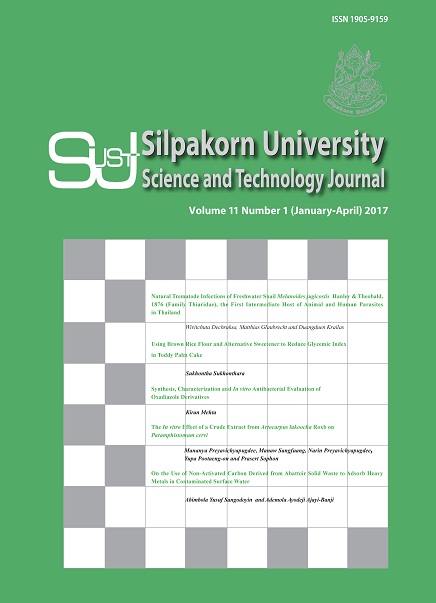Natural Trematode Infections of Freshwater Snail Melanoides jugicostis Hanley & Theobald, 1876 (Family Thiaridae), the First Intermediate Host of Animal and Human Parasites in Thailand
Main Article Content
Abstract
Melanoides jugicostis Hanley and Theobald (1876), a freshwater snail was reported as a species with wider occurrence, ranging from Burma to Thailand and Java. In Thailand, this species was found a few localities; however they can transmit parasites, as the first intermediate host of animal and human trematodes. The aim of this study was evaluated the natural infections of M. jugicostis snail in Thailand. The results of this work were data for veterinary and public health of surrounding study areas. The investigation was done by opportunistic collection between February and March 2012. The collected snails were examined trematode infections by shedding and crushing methods, based on a comparative analysis on morphology and anatomy of cercariae were described from living cercariae, fixed cercariae and cercarial drawing. A total of 555 snails were collected, 103 were found cercarial infections, the infection rates was 18.6% (103/555). Four types and four species of cercariae were categorized. They were Parapleurophocercous cercariae (Haplorchis pumilio), Pleurophocercous cercariae (Centrocestus formosanus), Xiphidiocercariae (Loxogenoides bicolor), and Furcocercous cercariae (Alaria mustelae). The infection rates were 16.04%, 0.54%, 1.08%, 0.72%, and 0.18%, respectively.
Downloads
Article Details
References
Dechruksa, W., Krailas, D., Ukong, S., Inkapatanakul, W., and Dangprasert, T. (2007). Trematode infections of freshwater snails family Thiaridae in Khek River. The Southeast Asian Journal of Tropical Medicine and Public Health, 38: 1016-1028.
Krailas, D., Namchote, S., Koonchornboon, T., and Inkapatanakul, W. (2006). Cercarial Infection of Freshwater Snails Family Thiaridae in Thailand. Department of Biology, Faculty of Science, Silpakorn University, Nakhonpathom, Thailand, pp. 1-421. [in Thai]
Krailas, D., Namchote, S., and Rattanathai, P. (2011). Human intestinal flukes Haplorchis taichui and Haplorchis pumilio in their intermediate hosts, freshwater snails of the families Thiaridae and Pachychilidae, in Southern Thailand. Zoosystematics and Evolution, 87: 349-360.
Krailas, D., Namchote, S., Koonchornboon, T., Dechruksa, W., and Boonmekam, D. (2014). Trematode infections obtained from freshwater snail Melanoides tuberculata (Müller, 1774) in Thailand. Zoosystematics and Evolution, 90(1): 57-86.
Mitchell, A. J., Overstreet, R. M., Goodwin, A. E., and Brandt, T. M. (2005). Spread of an exotic fish-gill trematode: a far-reaching and complex problem. Fisheries, 30: 11-16.
Pinto, H. A., and Melo, A. L. (2011). A checklist of trematodes (Platyhelminthes) transmitted by Melanoides tuberculata (Mollusca: Thiaridae). Zootaxa, 2799: 15-28.
Pointier, J. P., David, P., and Jarne, P. (2011). The biological control of the snail hosts of schistosomes: the role of competitor snails and biological invasions. In : Biomphalaria Snails and Larval Trematodes, Toledo, R., & Fried, B. (Eds.). Springer, New York, London, pp. 215-238.
Scholz, T., and Salgado-Maldonado, G. (2000). The introduction and dispersal of Centrocestus formosanus (Nishigori, 1924) (Digenea: Heterophyidae) in Mexico: a review. The American Midland Naturalist, 43: 185-200.
Ukong, S., Krailas, D., Dangprasert, T., and Channgarm, P. (2007). Studies on the morphology of cer car iae obtained from freshwater snails at Erawan Waterfall, Erawan National Park, Thailand. The Southeast Asian Journal of Tropical Medicine and Public Health, 38: 302-312.
Yamaguti, S. (1975). A Synoptical Review of Life Histories of Digenetic Trematodes of Vertebrates. 1st ed. Scientific Research Result from Ministry of Education, Kyoto, Japan, pp. 1-590.


